Module 4 A Social Survey -- My Neighbourhood课件
文档属性
| 名称 | Module 4 A Social Survey -- My Neighbourhood课件 |
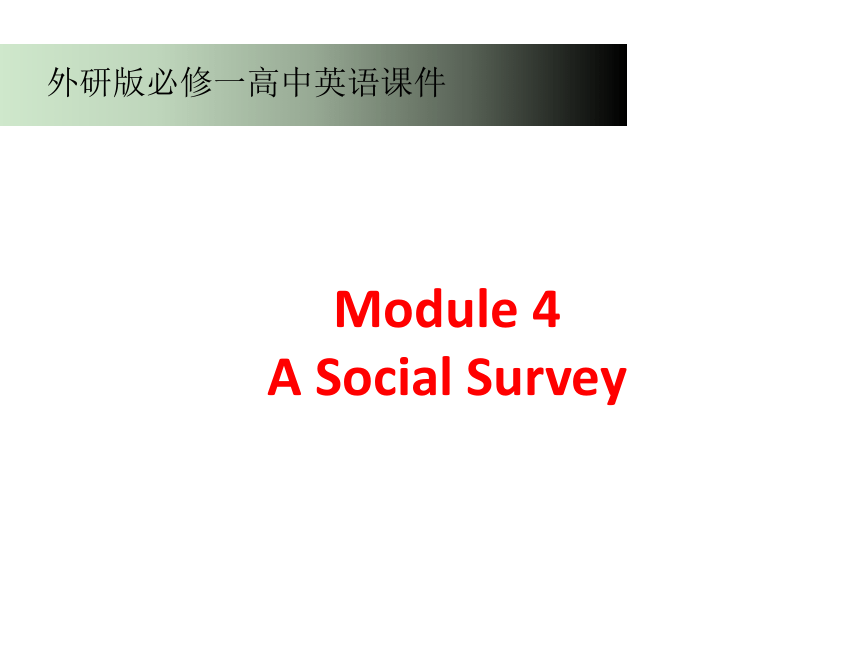
|
|
| 格式 | zip | ||
| 文件大小 | 27.0KB | ||
| 资源类型 | 教案 | ||
| 版本资源 | 外研版 | ||
| 科目 | 英语 | ||
| 更新时间 | 2014-10-21 00:00:00 | ||
图片预览

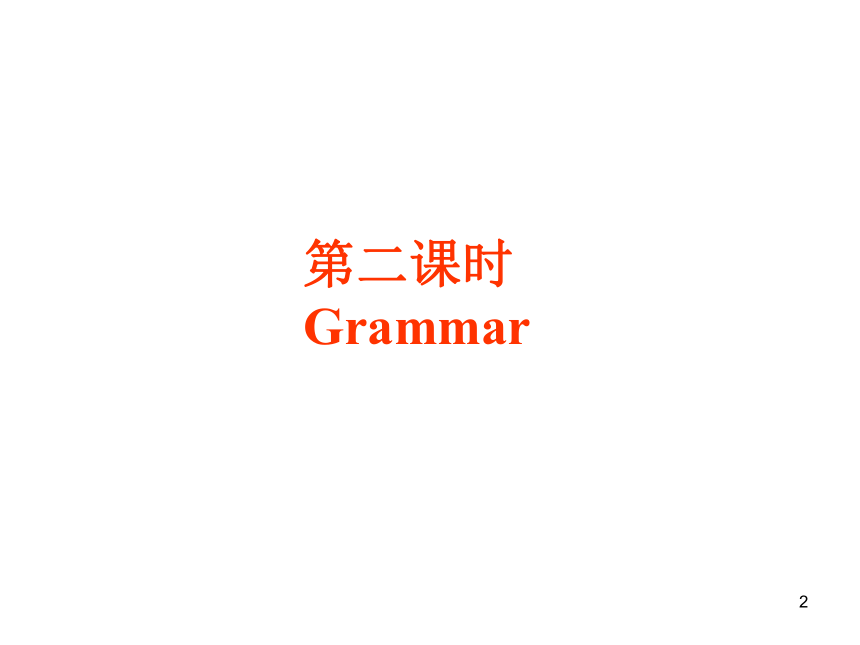
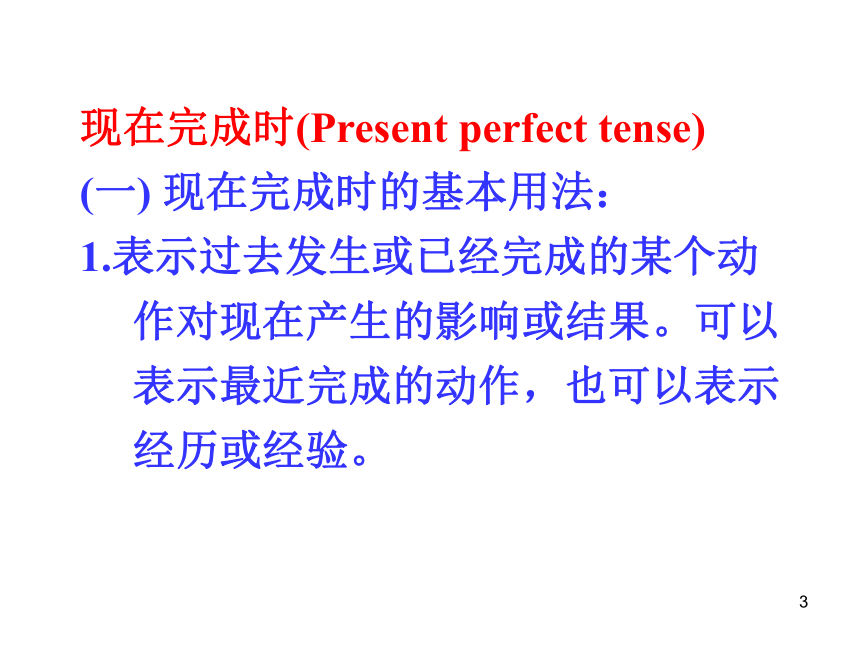
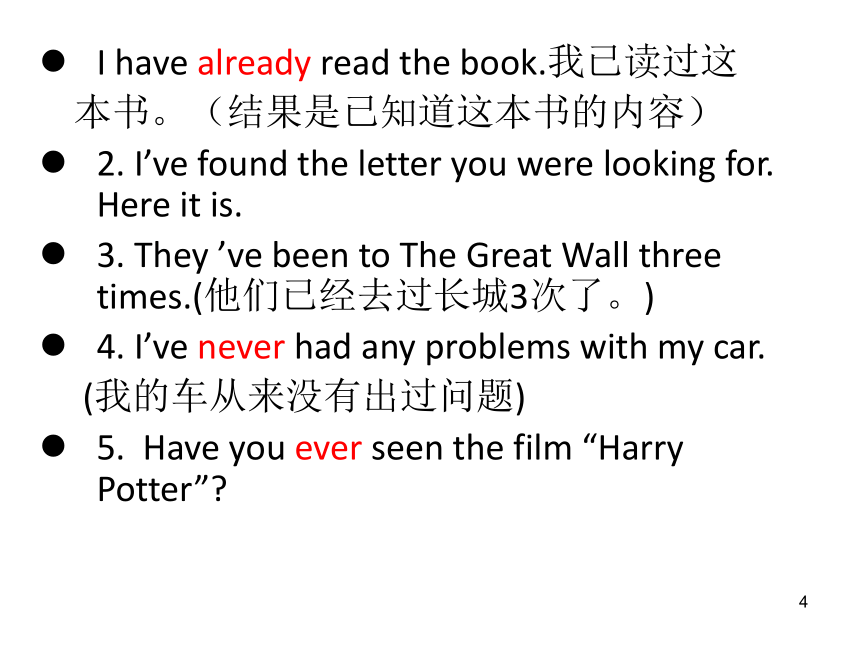
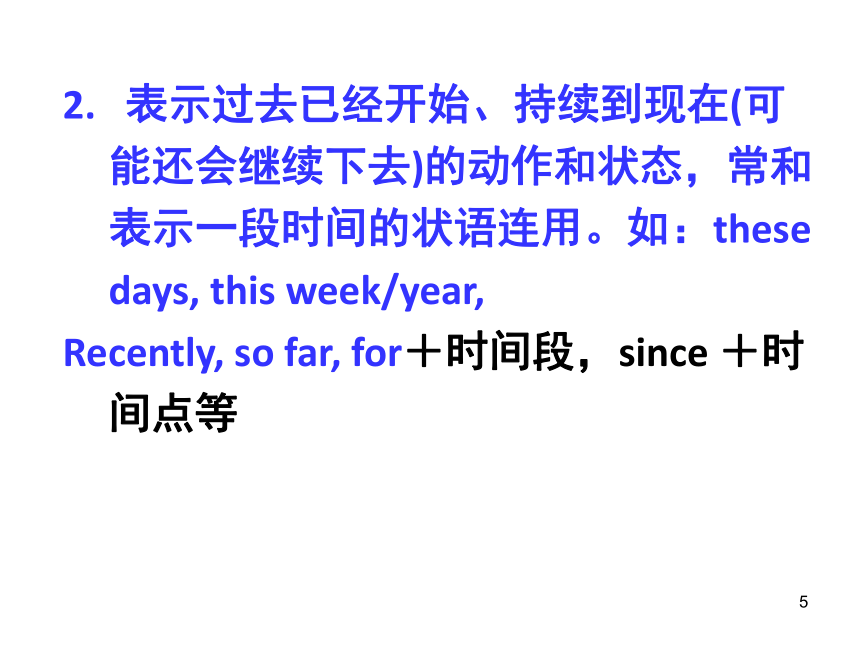
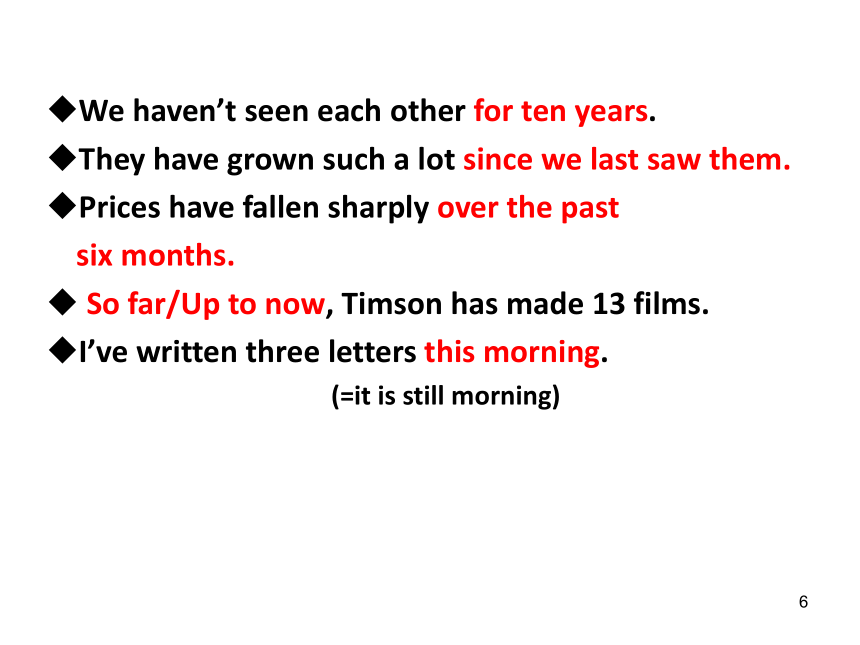

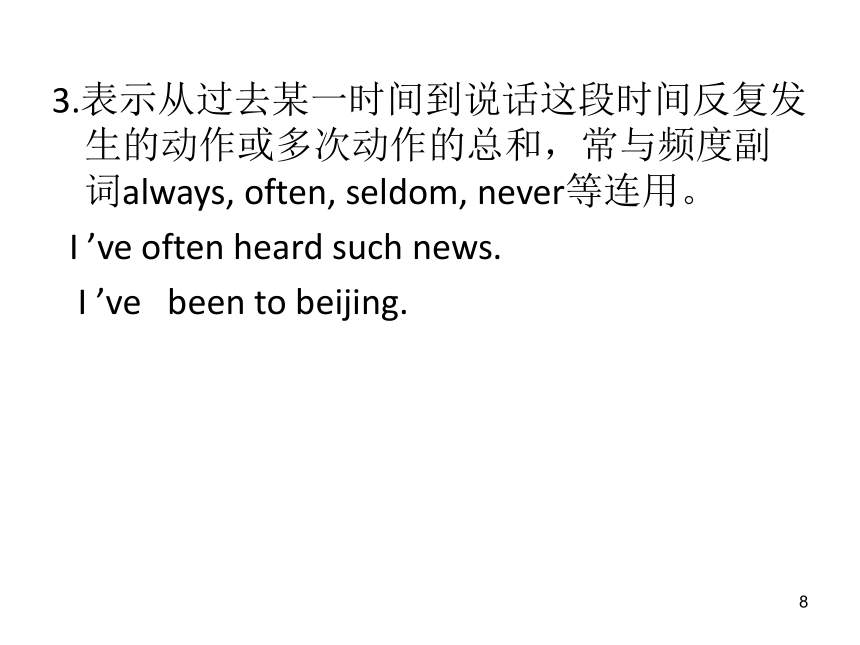
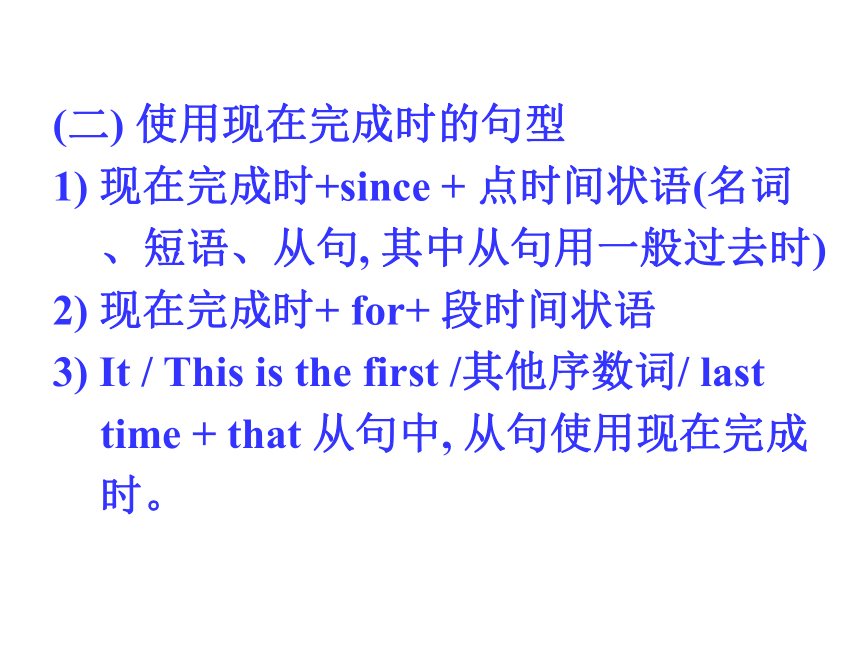
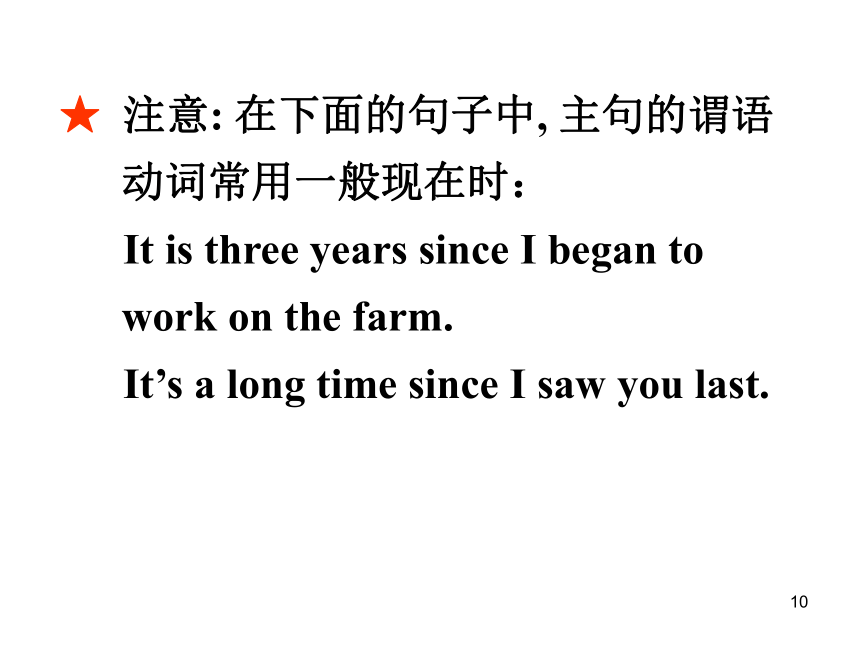
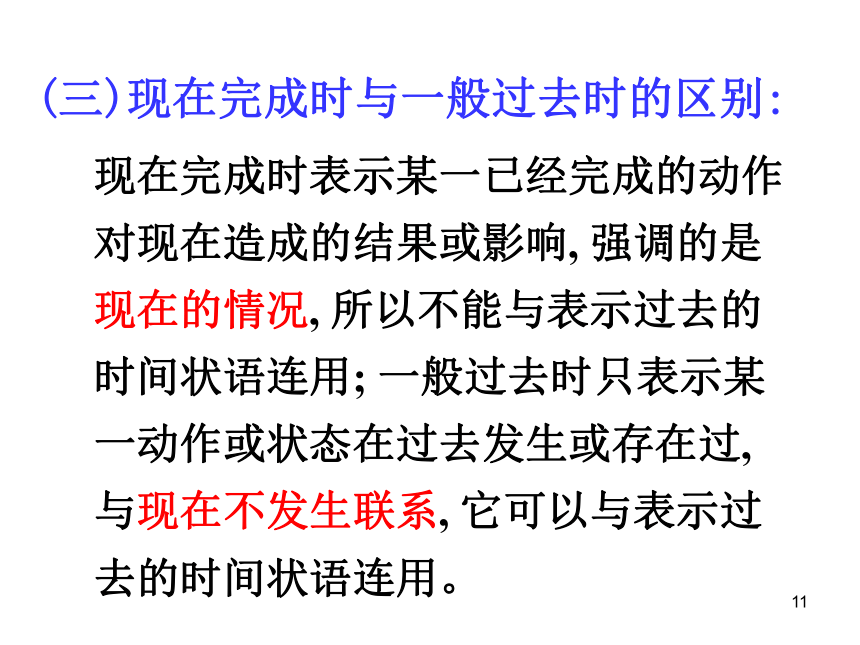
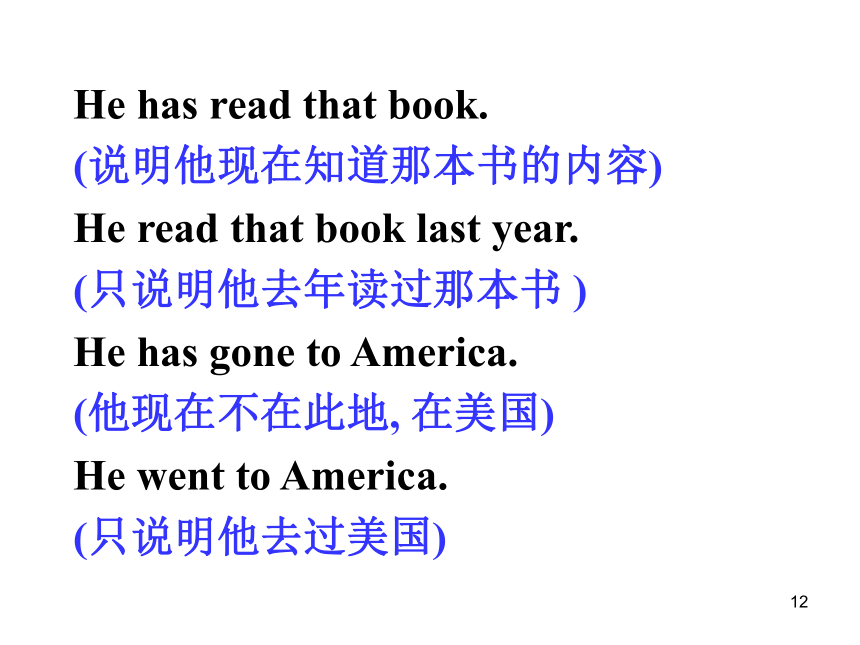
文档简介
课件30张PPT。外研版必修一高中英语课件Module 4
A Social Survey第二课时
Grammar 1现在完成时(Present perfect tense)
(一) 现在完成时的基本用法:
1.表示过去发生或已经完成的某个动作对现在产生的影响或结果。可以表示最近完成的动作,也可以表示经历或经验。1I have already read the book.我已读过这
本书。(结果是已知道这本书的内容)
2. I’ve found the letter you were looking for. Here it is.
3. They ’ve been to The Great Wall three times.(他们已经去过长城3次了。)
4. I’ve never had any problems with my car.
(我的车从来没有出过问题)
5. Have you ever seen the film “Harry Potter”?1
2. 表示过去已经开始、持续到现在(可能还会继续下去)的动作和状态,常和表示一段时间的状语连用。如:these days, this week/year,
Recently, so far, for+时间段,since +时间点等1We haven’t seen each other for ten years.
They have grown such a lot since we last saw them.
Prices have fallen sharply over the past
six months.
So far/Up to now, Timson has made 13 films.
I’ve written three letters this morning.
(=it is still morning)14. 现在完成时可以用在条件或时间状语从句中, 表示将来某个时刻之前已经完成的动作。
e.g. I’ll go home as soon as I have
finished my homework.
Please lend me that book if you have
finished reading it. 3.表示从过去某一时间到说话这段时间反复发生的动作或多次动作的总和,常与频度副词always, often, seldom, never等连用。
I ’ve often heard such news.
I ’ve been to beijing.1(二) 使用现在完成时的句型
1) 现在完成时+since + 点时间状语(名词、短语、从句, 其中从句用一般过去时)
2) 现在完成时+ for+ 段时间状语
3) It / This is the first /其他序数词/ last time + that 从句中, 从句使用现在完成时。★ 注意: 在下面的句子中, 主句的谓语动词常用一般现在时:
It is three years since I began to work on the farm.
It’s a long time since I saw you last.1现在完成时表示某一已经完成的动作对现在造成的结果或影响, 强调的是现在的情况, 所以不能与表示过去的时间状语连用; 一般过去时只表示某一动作或状态在过去发生或存在过, 与现在不发生联系, 它可以与表示过去的时间状语连用。(三)现在完成时与一般过去时的区别:1He has read that book.
(说明他现在知道那本书的内容)
He read that book last year.
(只说明他去年读过那本书 )
He has gone to America.
(他现在不在此地, 在美国)
He went to America.
(只说明他去过美国)1(四) 终止性动词与延续性动词:
1. 终止性动词: 表示短暂的运动状态,不能和表示一段时间的状语连用,常用的动词有: come, go, start, begin, leave, arrive, reach, get, get up , join, marry, open, close, give, lend, borrow, finish, break, see, hear, notice, find, understand, die 等。12. 延续性动词: 表示长时间的运动状态,能和表示一段时间的状语连用。
常用的动词有: live, study, work, teach, stay, read, play, fly, talk, rain, eat, run等11I have kept/had the new car for a month.
He has been dead for several years. 1. --- How are you today?
--- Oh, I ____ as ill as I do today for a
very long time.
A. didn’t feel B. wasn’t feeling
C. don’t feel D. haven’t feltExercises: 2. --- ___ David and Vicky ___
married?
--- For about three years.
A. How long have; been
B. How long have; got
C. How long were; being
D. How long did; get13. It is the third time you __ late this week.
A. had arrived B. arrived
C. have arrived D. are arriving
4. --- Did you enjoy your holiday?
--- Wonderful. It is years _____ I
enjoyed myself so much.
A. after B. when C. before D. since15. When I was at college, I __ three foreign languages, but I ___all except a few words of each.
A. spoke; had forgotten
B. spoke; have forgotten
C. had spoken; had forgotten
D. had spoken; have forgotten16. --- Where ____ the recorder? I can’t
see it anywhere.
--- I _____ right here. But now it’s
gone.
A. did you put; have put
B. had you put; was putting
C. have you put; put
D. were you putting; have put17. The price ____, but I doubt whether it will remain so.
A. went down B. will go down
C. was going down D. has gone down
8. They are discussing the problem the whole afternoon, but they ___ a decision so far.
A. didn’t reach B. won’t arrive at
C. haven’t come to D. all above19. —I have bought an English-Chinese
dictionary.
—When and where ____ you ____ it?
A. do; buy B. did; buy
C. have; bought D. had; bought110. — I heard the peasants here ___ very
poor in the past.
— Yes, but there ____ great changes in
the past few years.
A. were; were B. have been; have been
C. have been; were D. were; have been111.It is the most instructive lecture that I_____ since I came to this school.
A. attended B. had attended
C. am attending D. have attended
12. ---I didn’t ask for the name list .Why ___
0n my desk?
---I put it there just now in case you needed it.
A. does it land B. has it landed
C. will it land D. had it landed
113.When I got on the bus, I_____I had left my wallet at home.
A. was realizing B. realized
C. have realized D. would realize
14.By the time he realizes he ____into a trap,
it’ll be too late for him to do anything about it.
A. walks B. walked
C. has walked D. had walkedmovedComplete the conversation. Use the
preset tense of the verbs in brackets, and
for or since where appropriate.
Mike: Hi, Kate.
Kate: Hi, Mike.
Mike: I haven’t seen your brother around for a long time. _____ he ______ (move) to a new neighborhood? HasKate: No, he ______ ______ (move) to a new country! He ____ _____ (be) in Australia ______ last year.
Mike: Australia! That’s great country. ______ you ever _____ (be) there?hasn’t movedhasbeen sinceHave been1Kate: No, I _____ never ______ (be) there, but I _____ ________ (decide) to go later this year.
Mike: Great! _____ your brother ____ (send) you any photos _____ he moved there?havehave decidedHassincebeensent 1Kate: Yes, in fact, I _____ just ________ (receive) some. Here they are. This is his new house. He ____ recently _______ (finish) decorating it.receivedhas finishedhave1
A Social Survey第二课时
Grammar 1现在完成时(Present perfect tense)
(一) 现在完成时的基本用法:
1.表示过去发生或已经完成的某个动作对现在产生的影响或结果。可以表示最近完成的动作,也可以表示经历或经验。1I have already read the book.我已读过这
本书。(结果是已知道这本书的内容)
2. I’ve found the letter you were looking for. Here it is.
3. They ’ve been to The Great Wall three times.(他们已经去过长城3次了。)
4. I’ve never had any problems with my car.
(我的车从来没有出过问题)
5. Have you ever seen the film “Harry Potter”?1
2. 表示过去已经开始、持续到现在(可能还会继续下去)的动作和状态,常和表示一段时间的状语连用。如:these days, this week/year,
Recently, so far, for+时间段,since +时间点等1We haven’t seen each other for ten years.
They have grown such a lot since we last saw them.
Prices have fallen sharply over the past
six months.
So far/Up to now, Timson has made 13 films.
I’ve written three letters this morning.
(=it is still morning)14. 现在完成时可以用在条件或时间状语从句中, 表示将来某个时刻之前已经完成的动作。
e.g. I’ll go home as soon as I have
finished my homework.
Please lend me that book if you have
finished reading it. 3.表示从过去某一时间到说话这段时间反复发生的动作或多次动作的总和,常与频度副词always, often, seldom, never等连用。
I ’ve often heard such news.
I ’ve been to beijing.1(二) 使用现在完成时的句型
1) 现在完成时+since + 点时间状语(名词、短语、从句, 其中从句用一般过去时)
2) 现在完成时+ for+ 段时间状语
3) It / This is the first /其他序数词/ last time + that 从句中, 从句使用现在完成时。★ 注意: 在下面的句子中, 主句的谓语动词常用一般现在时:
It is three years since I began to work on the farm.
It’s a long time since I saw you last.1现在完成时表示某一已经完成的动作对现在造成的结果或影响, 强调的是现在的情况, 所以不能与表示过去的时间状语连用; 一般过去时只表示某一动作或状态在过去发生或存在过, 与现在不发生联系, 它可以与表示过去的时间状语连用。(三)现在完成时与一般过去时的区别:1He has read that book.
(说明他现在知道那本书的内容)
He read that book last year.
(只说明他去年读过那本书 )
He has gone to America.
(他现在不在此地, 在美国)
He went to America.
(只说明他去过美国)1(四) 终止性动词与延续性动词:
1. 终止性动词: 表示短暂的运动状态,不能和表示一段时间的状语连用,常用的动词有: come, go, start, begin, leave, arrive, reach, get, get up , join, marry, open, close, give, lend, borrow, finish, break, see, hear, notice, find, understand, die 等。12. 延续性动词: 表示长时间的运动状态,能和表示一段时间的状语连用。
常用的动词有: live, study, work, teach, stay, read, play, fly, talk, rain, eat, run等11I have kept/had the new car for a month.
He has been dead for several years. 1. --- How are you today?
--- Oh, I ____ as ill as I do today for a
very long time.
A. didn’t feel B. wasn’t feeling
C. don’t feel D. haven’t feltExercises: 2. --- ___ David and Vicky ___
married?
--- For about three years.
A. How long have; been
B. How long have; got
C. How long were; being
D. How long did; get13. It is the third time you __ late this week.
A. had arrived B. arrived
C. have arrived D. are arriving
4. --- Did you enjoy your holiday?
--- Wonderful. It is years _____ I
enjoyed myself so much.
A. after B. when C. before D. since15. When I was at college, I __ three foreign languages, but I ___all except a few words of each.
A. spoke; had forgotten
B. spoke; have forgotten
C. had spoken; had forgotten
D. had spoken; have forgotten16. --- Where ____ the recorder? I can’t
see it anywhere.
--- I _____ right here. But now it’s
gone.
A. did you put; have put
B. had you put; was putting
C. have you put; put
D. were you putting; have put17. The price ____, but I doubt whether it will remain so.
A. went down B. will go down
C. was going down D. has gone down
8. They are discussing the problem the whole afternoon, but they ___ a decision so far.
A. didn’t reach B. won’t arrive at
C. haven’t come to D. all above19. —I have bought an English-Chinese
dictionary.
—When and where ____ you ____ it?
A. do; buy B. did; buy
C. have; bought D. had; bought110. — I heard the peasants here ___ very
poor in the past.
— Yes, but there ____ great changes in
the past few years.
A. were; were B. have been; have been
C. have been; were D. were; have been111.It is the most instructive lecture that I_____ since I came to this school.
A. attended B. had attended
C. am attending D. have attended
12. ---I didn’t ask for the name list .Why ___
0n my desk?
---I put it there just now in case you needed it.
A. does it land B. has it landed
C. will it land D. had it landed
113.When I got on the bus, I_____I had left my wallet at home.
A. was realizing B. realized
C. have realized D. would realize
14.By the time he realizes he ____into a trap,
it’ll be too late for him to do anything about it.
A. walks B. walked
C. has walked D. had walkedmovedComplete the conversation. Use the
preset tense of the verbs in brackets, and
for or since where appropriate.
Mike: Hi, Kate.
Kate: Hi, Mike.
Mike: I haven’t seen your brother around for a long time. _____ he ______ (move) to a new neighborhood? HasKate: No, he ______ ______ (move) to a new country! He ____ _____ (be) in Australia ______ last year.
Mike: Australia! That’s great country. ______ you ever _____ (be) there?hasn’t movedhasbeen sinceHave been1Kate: No, I _____ never ______ (be) there, but I _____ ________ (decide) to go later this year.
Mike: Great! _____ your brother ____ (send) you any photos _____ he moved there?havehave decidedHassincebeensent 1Kate: Yes, in fact, I _____ just ________ (receive) some. Here they are. This is his new house. He ____ recently _______ (finish) decorating it.receivedhas finishedhave1
